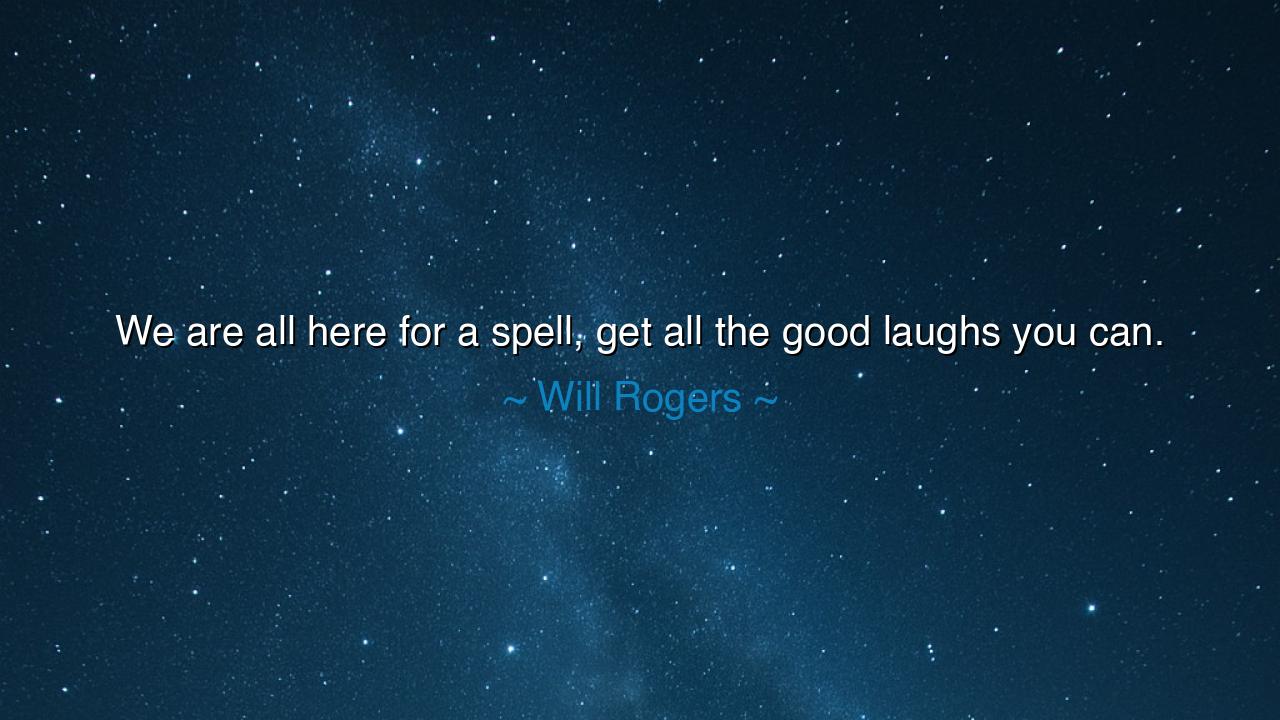
We are all here for a spell, get all the good laughs you can.






“We are all here for a spell, get all the good laughs you can.” – Will Rogers
In this simple and shining phrase, Will Rogers, the humorist-philosopher of America’s heartland, offers a truth as timeless as the stars. Beneath the wit lies a wisdom that echoes through the ages: that life is brief, a passing spell, a short sojourn upon the stage of existence — and in that briefness, laughter is both our armor and our grace. “Get all the good laughs you can,” he says, not as a fool’s jest, but as a sage’s command. For in laughter, the spirit remembers its freedom. In laughter, the soul rises above the burdens of the mortal hour.
The ancients knew this truth well. Even among the stoics of Greece, who spoke often of death and virtue, there was always room for mirth. They taught that joy is the soul’s rebellion against despair — the declaration that though our time be short, our light shall not be dimmed. To laugh is to acknowledge life’s absurdity, and yet to love it still. Rogers, who lived through wars, hardships, and the Great Depression, saw that humor was not the denial of pain but the transformation of it. His laughter was a bridge between sorrow and strength, between what is and what could be.
In his life, Rogers walked among presidents and farmers alike, and he spoke with the same warmth to both. During the dark years of the 1930s, when millions struggled and hope grew thin, he took to the radio not to preach, but to remind people to smile. With his easy Oklahoma drawl, he offered the weary nation this healing truth: “We’re all just passing through, so why not laugh along the way?” He made men and women laugh not because the times were good, but because they were hard. And in that laughter, they found courage. His humor did not belittle the struggle — it ennobled it, turning hardship into shared humanity.
There is an ancient story from the East of a dying monk who laughed as his body grew frail. When asked why he laughed, he said, “I have finally realized that life is a dream, and to wake from it with tears would be foolish.” Rogers would have understood him perfectly. To say “we are all here for a spell” is to recognize that our days are borrowed, our breath but a whisper in eternity. Yet that very brevity is what gives life its sweetness. A man who knows his time is short does not waste it in bitterness. He looks upon the fleeting sun and says, “How marvelous it is that I am here at all.”
To laugh, then, is not childish — it is sacred. It is the music of acceptance, the rhythm of resilience. When you laugh, you do not escape reality; you embrace it more fully, seeing both its comedy and its tragedy with clear eyes. Laughter is the flame that keeps the heart from freezing. It is the divine spark that says, “Though I cannot live forever, I will live well.” This is what Rogers meant — that in the brief spell of our being, joy is both duty and gift.
The lesson is this: do not waste your precious time in anger, envy, or sorrow. The world is heavy enough without your frown. Seek the good laughs, the shared smiles, the moments of light that make the burden easier for all. Laugh with your friends, even at your mistakes. Laugh at the absurdity of life, for it reminds you that you are alive. And when you find yourself in hardship, do as Rogers did — lift others through your humor, for laughter given is laughter multiplied.
So live with open eyes and a merry heart. Remember that you are here for a spell — a guest at life’s great feast. Do not leave the table without tasting the sweetness of joy. When your time comes to depart, let the echo of your laughter remain behind, a melody that others may hear and smile to. For in the end, all wisdom returns to this: that joy is not found at the end of life, but within it. And as Will Rogers, the jester-sage of his age, taught us — the world is too brief to live without laughter.






AAdministratorAdministrator
Welcome, honored guests. Please leave a comment, we will respond soon